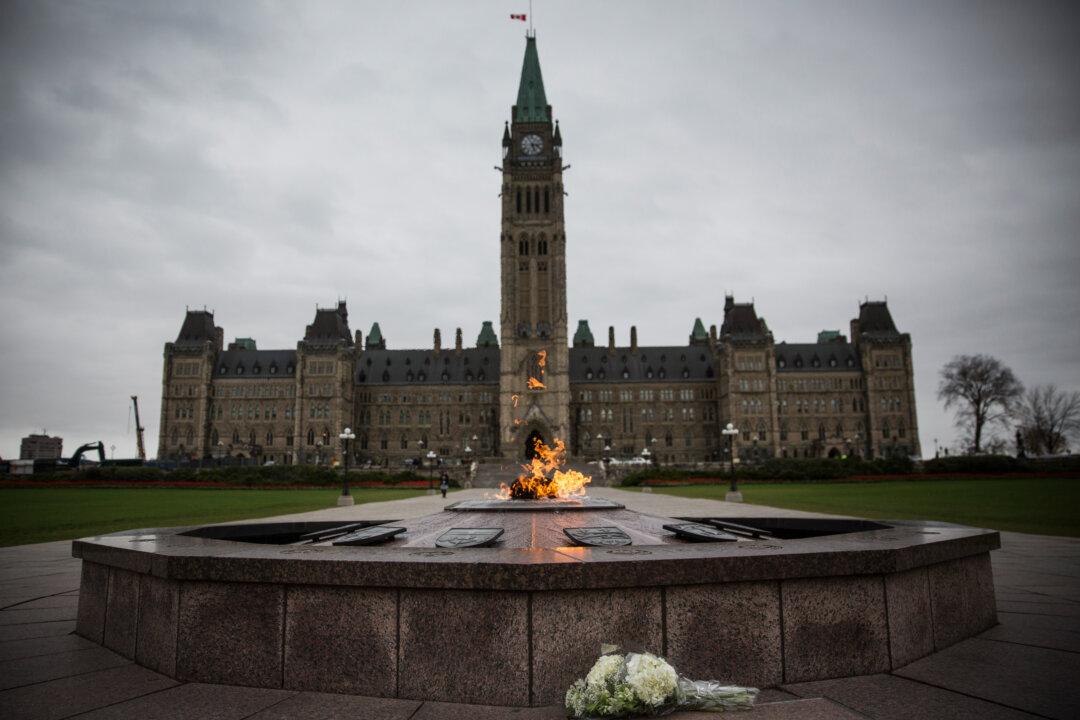OTTAWA—Parliament Hill was quiet Thursday after a lone shooter killed a ceremonial guard at the National War Memorial Wednesday, then stormed Canada’s Parliament.
The remnants of that gunfight are easy to spot: a bullet hole through the library door of Parliament, a chip broken off a historical fresco, and banged up doors, damaged as police broke them open with a sledgehammer, said a repairman.
On Thursday, Parliament was up and running but still not back to normal. There were no tourists meandering about, no protesters drawing attention to their causes. But even though Parliament was closed to the public, the front doors were open, and it looked like business as usual.
Partisanship took a back burner in Parliament; MPs from across the aisle exchanged hugs and handshakes.
Prime Minister Stephen Harper, who earlier called this an act of terrorism, told the House of Commons Thursday it will not have its intended impact.
“The goal of these attacks was to instill fear and panic in our country, and to interrupt the business of government. But as I said yesterday, Canadians will not be intimidated,” he said.
Hill Security
Harper pledged to tighten security on Parliament Hill as a result of the attack, but there are broader questions about what this will look like and just how exactly the prime minister’s pledge will unfold.
Members of Parliament (MPs) have already complained about security personnel stopping them on their way into Parliament, sometimes making them wait while a foreign leader’s motorcade drives to the front steps.
That scenario prompted MPs to call police and Sergeant-at-Arms, Kevin Vickers, before the procedure and house affairs committee the day before the shooting.
Vickers, now known the world over as the hero who stopped the gunman just steps from where the prime minister was meeting with his caucus, had pledged to do his best to ensure MPs had unrestricted access to Parliament.
Details Unfolding
But the events of Wednesday will put that challenge to a higher test.
The gunman, 32-year-old Michael Zehaf-Bibeau made his way to Parliament’s Centre Block by stealing a minister’s car and brandishing a gun when he rushed the front door.
A security guard grabbed the gun and was shot in the foot. Zehaf-Bibeau was taken down moments later by Vickers and other security personnel.
A few details are emerging about Zehaf-Bibeau, who was a Canadian citizen. U.S. officials said he was a recent convert to Islam and the Canadian police said Thursday he was in the process of applying for a passport when the attack happened. His mother said he wanted to travel to Syria.
Police said he was acting alone and was not on the nation’s wanted list.
“I think the passport figured prominently in his motives,” said Bob Paulson, Commissioner of the Royal Canadian Mounted Police.
Some urged that speculation be kept to a minimum, as police could not confirm Zehaf-Bibeau’s motive.
“I just don’t think it is prudent right now for people to either stoke fears or to diminish the threats when we just don’t know the facts,” said New Democratic Party finance critic Nathan Cullen.





